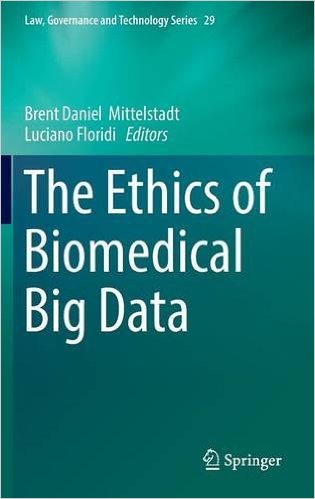By Brent Daniel Mittelstadt (Editor) and Luciano Floridi (Editor)
This book presents cutting edge research on the new ethical challenges posed by biomedical Big Data technologies and practices.

Professor Brent Mittelstadt is Professor of Data Ethics and Policy at the Oxford Internet Institute (OII) at the University of Oxford, and the OII’s Director of Research. He also coordinates of the Governance of Emerging Technologies (GET) research programme which works across ethics, law, and emerging information technologies. He is a leading data ethicist and philosopher specializing in AI ethics, professional ethics, and technology law and policy.
In his current role he leads the Trustworthiness Auditing for AI project, a three-year multi-disciplinary project with University of Reading cutting across ethics, law, computer science, and psychology to determine how to use AI accountability tools most effectively to create and maintain trustworthy AI systems. He also co-leads the A Right to Reasonable Inferences in Advertising and Financial Services project which examines opportunities and challenges facing sectoral implementation of a right to reasonable inferences in advertising and financial services.
Professor Mittelstadt is the author of highly cited works across topics including the ethics of algorithms, artificial intelligence (AI), and Big Data; fairness, accountability, and transparency in machine learning (ML); data protection and non-discrimination law; group privacy; ethical auditing of automated systems; digital epidemiology and public health ethics; and ethical design of personal health monitoring technologies.
Across these areas he has contributed several key policy analyses, technical fixes, and ethical frameworks to address the most pressing risks of emerging data-intensive technologies. These include (1) legal analysis of the enforceability of a “right to explanation” of automated decisions in the General Data Protection Regulation (GDPR); (2) the development of a method and ethical requirements for providing “meaningful explanations” of automated decisions in the form of ‘counterfactual explanations’; (3) a novel, legally compliant fairness metric to detect bias in AI and machine learning systems (‘Conditional Demographic Disparity’); and (4) a classification scheme for fairness metrics based on non-discrimination law. These contributions are widely cited and have been implemented by researchers, policy-makers, and industrial bodies internationally, featuring in policy proposals and guidelines from the UK government, Information Commissioner’s Office, and European Commission, as well as products from Google, Amazon, and Microsoft.
Professor Mittelstadt is the recipient of several prestigious awards recognising the impact of his work on scholarship, policy, and society. In 2018 and 2021 he received O2RB Excellence in Impact Awards for his work on explanations in AI, counterfactual explanations, and AI fairness and bias in non-discrimination law. In 2019 he was delighted to receive the best paper award at the Privacy Law Scholars Conference (PLSC) for his work on the ‘right to reasonable inferences’ in data protection law.
Professor Mittelstadt has substantial experience in leading and coordinating multi-disciplinary work across large-scale, multi-partner projects. His work has been funded by a variety of fellowships including a British Academy Postdoctoral Fellowship as well as research grants from funders such as the Wellcome Trust, Department of Health and Social Care, Sloan Foundation, Miami Foundation, and Luminate Group. In addition to his current roles, Professor Mittelstadt previously led a team of researchers on the ROADMAP project working on the ethics and governance of a pan-European data platform for Alzheimer’s research. He also led work on the ‘Privacy and Trust’ stream as part of the EPSRC PETRAS National Centre of Excellence for loT Systems Cybersecurity.
Ethics; data ethics; moral philosophy; applied ethics; AI ethics; professional ethics; medical ethics; technology governance and policy; data protection law; non-discrimination law; fairness, accountability, and transparency in machine learning; medical expert systems; epistemology
By Brent Daniel Mittelstadt (Editor) and Luciano Floridi (Editor)
This book presents cutting edge research on the new ethical challenges posed by biomedical Big Data technologies and practices.


This project will develop useful and responsible machine learning methods to achieve real-world early detection and personalised disease outcome prediction of inflammatory arthritis.

This OII research programme investigates legal, ethical, and social aspects of AI, machine learning, and other emerging information technologies.

This project will evaluate the effectiveness of accountability tools addressing explainability, bias, and fairness in AI. A ‘trustworthiness auditing meta-toolkit’ will be developed and validated via case studies in healthcare and open science.
In the past five years my work has been financially supported by the Wellcome Trust, Sloan Foundation, Department of Health and Social Care via the AI Lab at NHSx, British Academy, John Fell Fund, Alan Turing Institute, Engineering and Physical Sciences Research Council, Miami Foundation, and Luminate Group. As part of my science communication and policy outreach, I have served in an advisory capacity for the Office for National Statistics, Fable Data, Mind Foundry, and GSK Consumer Healthcare.
I conduct my research in line with the University's academic integrity code of practice.

With Professor Sandra Wachter and Professor Brent Mittelstadt
The current state of AI regulation, the challenges of regulating complex technologies and the risks of leaving big decisions to tech giants.

With Professor Luciano Floridi and Professor Brent Mittelstadt
Workshop bringing together expertise to address emerging challenges in the field, and the requirements for a European framework for ethical usage of biomedical Big Data.

With Professor Brent Mittelstadt
Workshop bringing together expertise to address emerging challenges in the field, and the requirements for a European framework for ethical usage of biomedical Big Data.

7 July 2025
Whether it is merely long-term hype or near-term reality, Large Language Models (LLMs) in medicine are well-positioned to engage with a wide range of medical tasks and be used for medical research purposes.

7 May 2025
New Oxford study uncovers explosion of accessible deepfake AI image generation models intended for the creation of non-consensual, sexualised images of women.

7 August 2024
Leading experts in regulation and ethics at the Oxford Internet Institute, part of the University of Oxford, have identified a new type of harm created by LLMs which they believe poses long-term risks to democratic societies and needs to be addressed

5 February 2024
As we mark Safer Internet Day, Professor Sandra Wachter, spoke to us about the online phenomenon known as ‘deepfakes’, how to spot them and the implications of the growing proliferation of deepfakes for internet safety.

Somewhere on Earth: The Global Tech Podcast, 20 May 2025
A new study reveals nearly 35,000 publicly downloadable AI models capable of generating deepfake pornography—often targeting women and celebrities.
Cherwell, 14 May 2025
A new study from the Oxford Internet Institute (OII) has found a sharp rise in the number of AI tools used to generate deep fake images of identifiable people, primarily targeting women.

Oxford Mail, 07 May 2025
The lead author of a new Oxford University says there is an 'urgent need' for more controls to tackle the rise of deepfakes.
This course will introduce to some of the fundamental questions that have been raised in this domain across the social sciences.